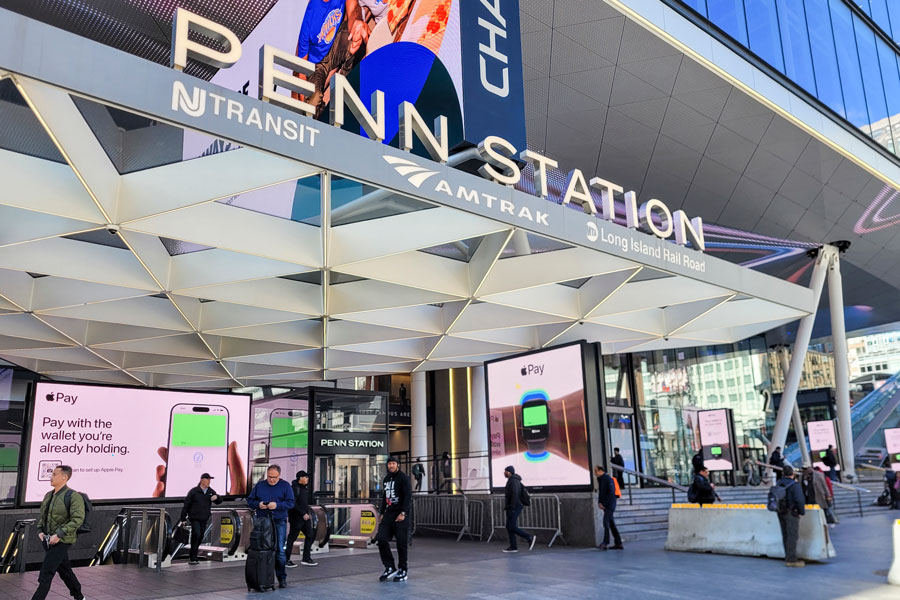
NEW YORK, NY – A series of undercover operations by Amtrak Police inside New York City’s Penn Station has led to nearly 200 arrests since June, raising questions from lawmakers and advocates about policing tactics, civil rights, and the treatment of LGBTQ individuals.
According to reports, Amtrak Police began targeting the men’s restroom near the Eighth Avenue and 31st Street entrance of Penn Station earlier this summer. In June alone, 23 arrests were made for public lewdness, compared to just eight in the five months prior. By late September, the number of arrests had climbed to almost 200, with some days reportedly seeing as many as 20 men detained.
Several of those arrested were turned over to federal immigration authorities, as Amtrak Police, unlike local law enforcement, are not bound by New York’s sanctuary city restrictions. At least 20 individuals are believed to have been placed into ICE custody.
The location had become a well-known meetup point on hookup apps, including Sniffies, which reportedly drew the attention of undercover officers. Police are said to have posed in stalls or at urinals to observe behavior. Critics argue the tactics echo historic “cruising stings” that disproportionately targeted gay and bisexual men.
Civil rights advocates have also pointed to the high rate of dropped charges as evidence that arrests may have been based on weak grounds. Some individuals claim they were arrested despite engaging in no illegal behavior. Allegations have also surfaced of officers using anti-LGBTQ slurs during the operations.
Several New York elected officials – including U.S. Representative Jerry Nadler, State Senator Liz Krueger, State Senator Brad Hoylman-Sigal, and Assemblymember Tony Simone – have pressed Amtrak for explanations. They have called for an immediate halt to the arrests, citing concerns about discrimination and overreach by a federally run police force operating inside the city’s busiest transit hub.
The controversy also comes in the shadow of past lawsuits. The Port Authority Police previously faced a class-action case for similar bathroom patrols, eventually agreeing to end plainclothes sting operations.
The issue gained further attention in early September when NYPD Sergeant Michael Merritt was allegedly caught up in the same bathroom sting. He was suspended by the department and remains under investigation. It is not clear whether criminal charges have been filed in his case.
Amtrak has defended the increased enforcement as a public safety measure, noting that disruptive incidents have declined since the sting operations began. Officials have not provided detailed comment on the specific allegations or the involvement of ICE.
Despite the growing scrutiny, much remains unclear. Court records have not yet confirmed the outcome of most arrests, leaving unanswered whether charges will lead to convictions or dismissals. Details of Amtrak’s protocols, officer conduct, and cooperation with federal immigration authorities also remain undisclosed.
Amtrak Penn Station Bathroom Arrests
| Key Detail | Information |
|---|---|
| Location | Penn Station men’s restroom near 8th Ave & 31st St entrance |
| Start of Operation | June 2025 |
| Arrests Reported | Nearly 200 since June |
| Charges | Primarily “public lewdness” |
| ICE Transfers | At least 20 individuals |
| Political Response | Lawmakers demand halt and investigation |
| Notable Case | NYPD Sgt. Michael Merritt suspended after being detained |
Q&A Penn Station Bathroom Sting
Why is Amtrak involved instead of NYPD?
Penn Station is federally owned, giving Amtrak Police jurisdiction alongside other transit agencies. This allows Amtrak to pursue enforcement independently of city and state policies.
Why are immigration referrals involved?
As a federal police force, Amtrak cooperates with ICE. Unlike NYPD, it is not restricted by sanctuary city rules.
Are the arrests legally strong?
Reports suggest many cases have already been dismissed, raising questions about the sufficiency of evidence and whether individuals were wrongly targeted.
Why are politicians concerned?
Officials argue the tactics may amount to discrimination, disproportionately affecting LGBTQ individuals, and resemble outdated sting operations long considered unconstitutional or abusive.
What happens next?
Lawmakers have requested Amtrak end the practice and provide explanations. Civil rights groups are weighing possible legal challenges, and the outcome of ongoing cases could determine whether courts step in.


